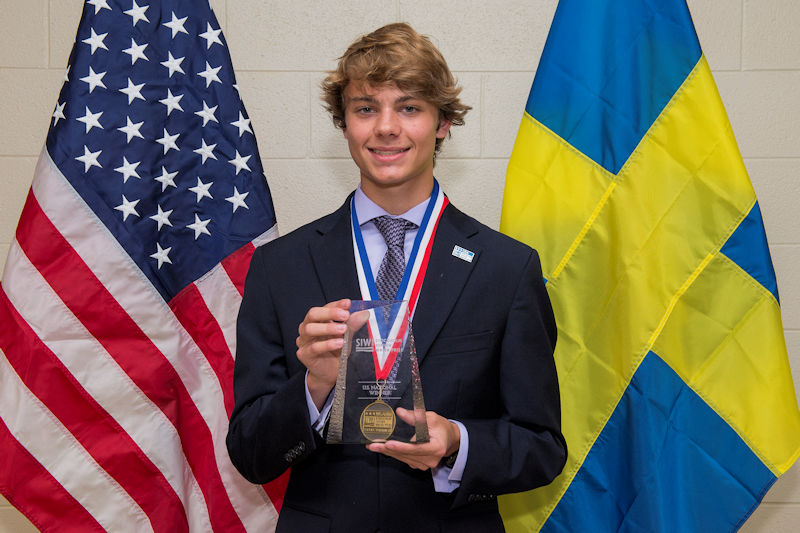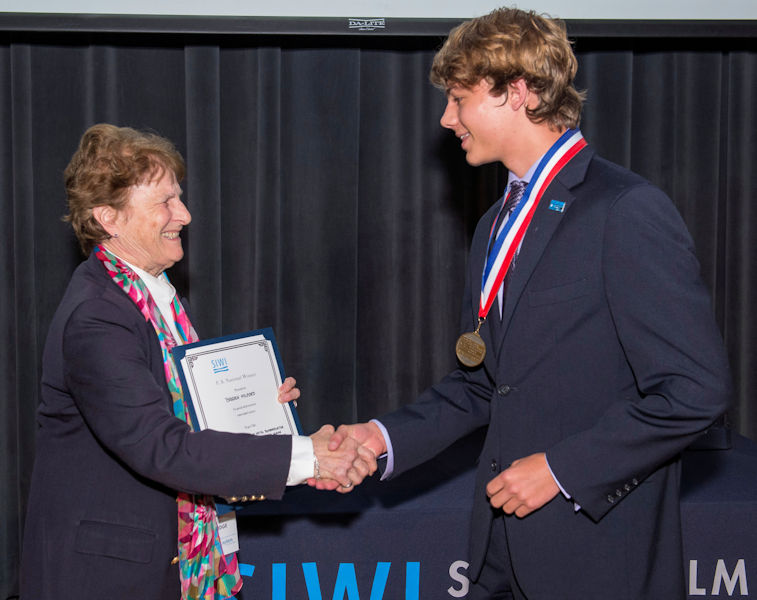Oklahoma high school student takes metal-removing system to Stockholm

Braden Milford won the 2018 U.S. Stockholm Junior Water Prize (SJWP) competition for his research into using alginate beads to remove heavy metal contamination from water. Photo courtesy of AOB Photo.
Braden Milford had a mission: develop a system that could remove heavy metals from waterways. The Tulsa, Okla., high school student successfully accomplished this mission using alginate beads.
For his project, Milford won the 2018 U.S. Stockholm Junior Water Prize (SJWP) competition. In August, he will travel to Stockholm, Sweden to represent the U.S. at the international SJWP competition.
Since the persistence of heavy metal contamination in aquatic ecosystems continues to be a widespread problem, Milford was not content to perform his research only in the laboratory. He collected samples of contaminated water from two different U.S. Environmental Protection Agency (EPA) Superfund mine sites. Then, he conducted a five-step research project to find a cost-effective solution.
Milford determined the concentration of heavy metals at different points along his chosen waterways and analyzed bacteria found in the samples. He isolated the bacteria for use in a bioremediation system. The bacterial isolates were screened for heavy metal resistance as well as the ability to form biofilms in the presence of high heavy-metal concentrations.
Bacteria that demonstrated resistance to the contaminants were combined with mixed green algae inside a sodium-alginate bead. Photosynthesis stimulates the bacteria’s biofilm formation, and these biofilms remediate heavy metals in water. As this remediation occurs, metal concentration in the water decreases, allowing the algae to continue to grow and thrive. As the algae continues photosynthesis, the beads also increase dissolved oxygen in the waterway.
“[The] symbiotic relationship between the algae and bacteria is the key to the success of the system,” according to Milford’s research. He examined six different genera of bacteria in the alginate beads. Then, he tested the system’s ability to remove lead, manganese, iron, cadmium, chromium, cobalt, and zinc. Each bacterial isolate culture proved able to reduce at least one of the seven heavy metals examined by more than 80%. The Bacilius bacteria was the most effective, removing between 79.4% and 95.8% of six of the metals tested and removing 42% of manganese.

From left, Jeanette Brown, past-president of the Water Environment Federation (Alexandria, Va.) and head judge of the 2018 U.S. SJWP competition, presents Milford with his award. Milford will represent the U.S. at the international SJWP competition in August. Photo courtesy of AOB Photo.
Producing a bioremediation system of 600 alginate beads cost about $10. The system offers a cost-effective solution when compared to the $300 million EPA spends annually to address drainage from abandoned mining sites through the Superfund program, Milford’s research report says. Milford will join winners from around the world for the international SJWP competition during World Water Week, Aug. 26-31.
SJWP aims to increase students’ interest in water-related issues, research, and careers as well as to raise awareness about global water challenges. The Water Environment Federation (Alexandria, Va.) and its Member Associations organize the regional, state, and national competitions with support from Xylem Inc. (Rye Brook, N.Y.), a sponsor of the international competition.
For more information about the other competition winners, read the Highlights article, “Introducing the Winners of 2018 U.S. SJWP Competition.”
— Jennifer Fulcher, WEF Highlights
Milford Shares Experiences in YP Connections
|








July 30, 2018
Featured